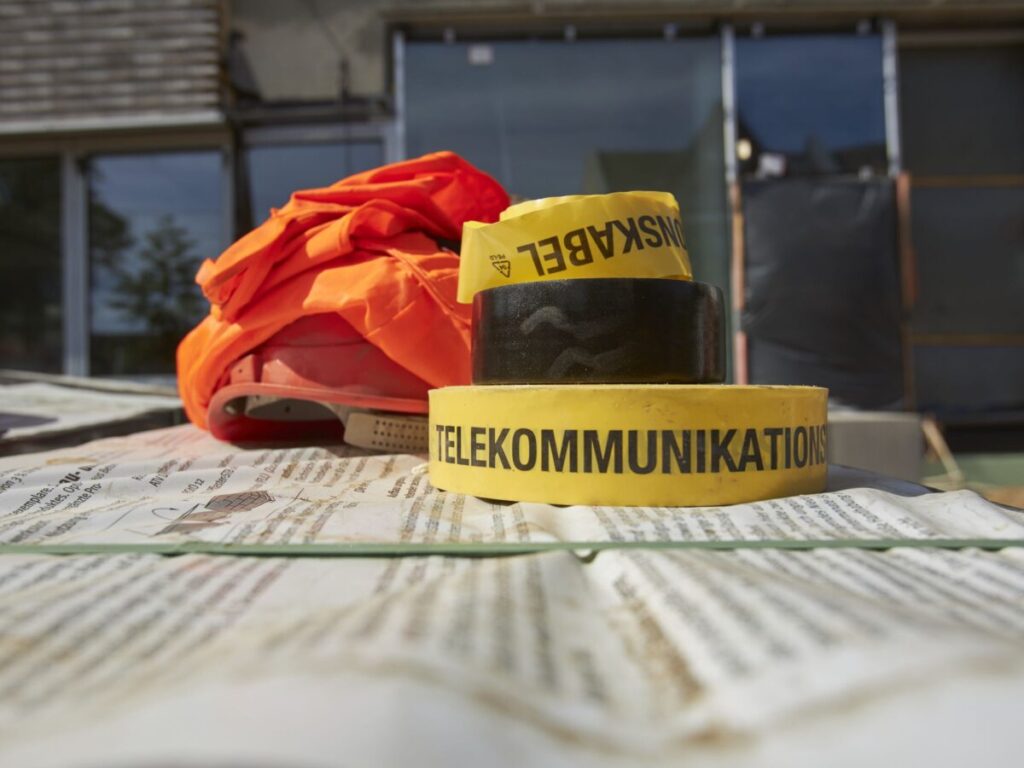When the general election is at the end of September, you will also use your vote to decide how broadband expansion, 5G and fiber optic networks will continue. We have summarized the positions of the parties on this.

TABLE OF CONTENTS
1 CDU / CSU: Comprehensive fiber optic and cell phone network
2 SPD: 1 gigabit for every household
3 Green: FTTB for everyone and local roaming
4th FDP: 5G by 2025
5 AFD: Rethink frequency allocation practice
6th The Left: Nationalize fiber optic and cell phone networks
The selection of the parties mentioned depends on whether the parties are currently represented in the Bundestag. The order is editorially chosen.
CDU / CSU: COMPREHENSIVE FIBER OPTIC AND CELL PHONE NETWORK
Let’s start with the current governing parties. The Union parties CDU and CSU have agreed on a common election program. The buzzword “digital” seems to be important to the Union: it appears 196 times in the election manifesto. ” 5G ” and “broadband” twice, “fiber optic” once.
The Union parties focus primarily on supplying the rural regions. “Our claim is: Everything must be accessible from the village! We are working flat out on gigabit connections and a nationwide mobile network connection, as soon as possible with 5G. ” It is also clear to the Union that the expansion of the providers cannot be economical in all regions. “Wherever the profitability audit of companies for the installation of fiber optic cables fails, we will enable the municipalities to drive the broadband expansion on their own.”
In the further course of the election program it is said that cities, municipalities and states “want to support digitization with a new smart city and a smart country strategy […].” In rural regions, plans are being made to promote co-working spaces for creative work alongside the massive expansion of broadband. That is also good for climate protection because it avoids a lot of commuter flows.
In mobile communications it is the goal of the CDU / CSU “to remove all white spots with stationary or mobile masts by 2024 at the latest”. The principle of “new frequencies only against nationwide coverage” is also to be laid down in law. The recently founded mobile communications infrastructure company should create a nationwide 5G network throughout Germany by 2025. In addition, it should provide a total of 15 billion euros for gigabit networks by 2025. An “unbureaucratic, digital and rapid approval practice” should accelerate the expansion of the network. However, alternative laying methods would also have to be used more extensively during expansion. “For example, alternative laying methods in shallower laying depths are already legally possible, but still meet with skepticism,” says the election program.
SPD: 1 GIGABIT FOR EVERY HOUSEHOLD
The SPD’s election program is clear with regard to the terms fiber optics, broadband and 5G: none of these words appear. When it came to the term “digital”, we only came up with 92 digits.
“Fast, secure and affordable internet access is indispensable in the 21st century,” says the SPD’s election manifesto. In the 2020s, Germany must become a “gigabit society”. Medium-sized companies in rural areas, which often operate globally, depend on fast internet in order to remain competitive. “In order to keep this promise, we will guarantee the supply of all households and companies with a bandwidth of at least one gigabit per second – through specific, legally defined expansion and supply obligations and corresponding intermediate goals.”, So the SPD. But the providers are also directly responsible: “The network operators are also responsible here,” says the election program, without going into further detail.
Digitization should not divide society. “Access to the network must be affordable. We will therefore create a social tariff for network access for citizens with low incomes, for schoolchildren and students. ” For the SPD, digital participation also includes accessibility.
GREEN: FTTB FOR EVERYONE AND LOCAL ROAMING
If you search through the election manifesto of the Greens, you come across five hits for the term fiberglass. There is one hit with 5G, three with broadband and 163 with digital. For the Greens, fast internet “regardless of whether city or country, whether mobile work, innovative business or teaching” is the “essential prerequisite for social participation”. Fast internet is also important for equal living conditions. For us, it is part of the public service.
The Greens complain that Germany, with fewer than two million active fiber optic connections, is far behind in all comparisons. “The future belongs to fiber optics,” said the Greens in their election manifesto for the federal election. “Our goal is fast, inexpensive and reliable fiber optic internet ( FTTB ) in every home.” They want to ensure that funding “arrives unbureaucratically where it is needed most”. Open access to existing fiber optics is to be strengthened and blockades are to be removed in order to accelerate the expansion. “The comprehensive expansion of fiber optics should also be promoted within the framework of operator models and secured in the long term.”
However, it is also important for people to have fast internet access in the short term. They want “to design a legal right to fast Internet access in such a way that it is unbureaucratic and easy to enforce. With minimum bandwidths that are based on people’s usage habits. ” Net neutrality should continue to be secured and consistently enforced.
“And we put an end to the bandwidth cheating,” promise the Greens. “If telecommunications companies do not deliver the promised download speeds, there should be uncomplicated, flat-rate damages and high fines.”
In mobile communications, it is important “to ensure comprehensive coverage, regardless of the network you are surfing on.” If the providers do not make any voluntary cooperation agreements, “if necessary, local roaming must be arranged, of course with appropriate remuneration.” In future frequency auctions, the coverage requirements for the area are to be adjusted so that they keep pace with increasing demand. This is especially true along railway lines and roads.
FDP: 5G BY 2025
In the election manifesto of the FDP we found the terms fiber optics and broadband once, 5G twice and “digital” 133 times.
The FDP calls for “comprehensive and high-performance cellular coverage through real competition on the cellular market as well as a fiber optic network and a consistent upgrade of existing cellular networks.” The goal of the free democrats is to complete the nationwide development of 5G networks by 2025. An “efficient auction design as well as strong and timely controlling by the federal government” should make the expansion goals achievable. “A high-performance cellular network is a basic requirement for the future viability of Germany as a location,” said the FDP.
For the fiber optic network, the FDP wants “Gigabit vouchers for private households as well as small and medium-sized companies.” The vouchers are used to reimburse part of the costs incurred when switching to gigabit. “This is how we want to accelerate the expansion of high-speed networks in a demand-oriented and cost-efficient manner.” This creates “an effective incentive for investments in gigabit network expansion”.
The FDP also emphasizes the importance of net neutrality. “All data packets on the Internet must have equal rights. This ensures that no opinion is discriminated against and that new companies gain market access. ” At the same time, however, they also want to “enable new quality-assured services.” This also includes special services with “ network slicing ” for time-critical applications, as is possible with 5G. The FDP speaks here of medical teleoperations or autonomous driving. “The non-discriminatory design must be safeguarded under competition law”.
AFD: RETHINK FREQUENCY ALLOCATION PRACTICE
At AFD we stumbled across the term fiber optics five times, once about 5G and 69 times about “digital”. Broadband does not appear in the election program of the AFD.
The AfD calls for regional structures to be promoted, including in the expansion of fiber optics and radio networks, along the lines of “national roaming”. It also says: “The network transition between operators must be unnoticed and cost-neutral for users.” From the point of view of AFD, in the case of a 5G network expansion, “the future use of higher frequencies with regard to health risks must continue to be accompanied by ongoing scientific investigations and the citizens must be comprehensively informed about their results.”
When it comes to network expansion, the AFD advocates “the nationwide, provider-open provision of fiber optic connections and a high-performance, nationwide cellular network.” The current practice of the mobile radio frequency band auction could become an obstacle to the nationwide expansion and price driver for the end customer. This practice must therefore be “fundamentally reconsidered”.
In the Bundestag election program, the AFD describes the current fiber optic expansion in Germany as being characterized by isolated solutions and “white spots” in rural areas and parallel structures in metropolitan areas. “Better and comprehensive coordination is imperative here.”
THE LEFT: NATIONALIZE FIBER OPTIC AND CELL PHONE NETWORKS
A look at the election manifesto of the left shows that 5G is not showing up. Broadband is mentioned five times, fiber optics three times and digital 135 times.
“The profit-oriented mobile network operators have no interest in nationwide network expansion,” says “Die Linke”. The network expansion must be based on the goal of reliable supply and the common good. “For this purpose, the broadband and mobile networks must be in public hands,” it says in the election manifesto. “We are promoting fiber optic expansion with investments of 10 billion euros annually throughout Germany.” According to the party, the municipalities should be able to operate the networks permanently in public hands. “All apartments should have fiber optic connection (FFTH)”, it says including typing errors – what is meant is FTTH – in the election program.
When it comes to mobile communications, the Left advocates abolishing the three – soon four – separate networks in Germany. “We want a uniform mobile network from a single source that ensures coverage of the entire area. A single network is more cost-effective than parallel networks and reduces radiation exposure. The competition between the providers leads to unnecessary multiple structures and in many places to no network at all. ” From the perspective of the party, network expansion and operation should therefore be carried out by the public sector. This ensures good network quality across the board as well as the working conditions of the employees. A federal company operates the public cellular network. ” The previous providers “can offer their services over the public network”.
Another approach of the left: “Internet must be part of the basic service. Telephone connection and internet (like electricity and water) may not be switched off, not even if there is a payment arrears. ” The costs for this would have to be taken into account in the minimum income, as well as for the end devices. Every child needs a free loan device from the school for the entire school period.
In terms of rural provision, the party wants to create “social centers close to home in the villages, which serve as meeting places and offer basic services such as post office, bank and public Internet access. The net neutrality must be secured by constitution.


